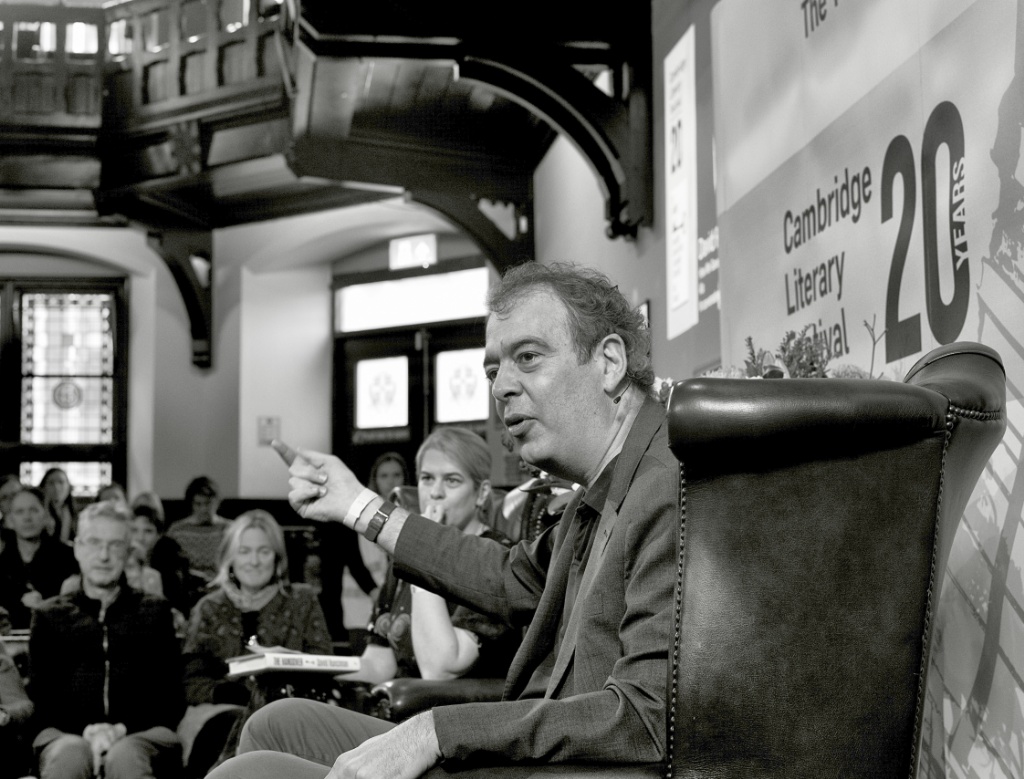The Handover

David Runciman, discussing his new book with Helen Lewis in the Cambridge Union last Sunday. See below for a transcript of their conversation.
Quote of the Day
”Good fiction’s job is to comfort the disturbed and disturb the comfortable.”
- Slogan on a bookshop’s tote bag
Musical alternative to the morning’s radio news
Van Morrison | Brown Eyed Girl
I’d forgotten how nice this is.
Long Read of the Day
Transcript of the conversation between Helen Lewis and DR on Sunday last.
Helen Lewis
Silicon Valley, which is about building systems and algorithms, is also struggling still with the Great Man theory of history. And I think that’s fascinating. What is the worth of OpenAI without Sam Altman? Is the product the thing or is actually the evangelism of him and what he represents? Which is the same question I think we’re having about “What is Tesla or SpaceX or Twitter/X without Elon Musk?” or “What is Meta without Mark Zuckerberg?”
You touched on this in the book, that we want these things to have agency. So we often find it convenient to assign that all to a person. We want Mark Zuckerberg to be sitting there with a big dial marked racism, turning it up and down on Facebook, rather than it being a chaotic outcome of very complicated systems that have gone beyond the human brain to understand.
David Runciman
One of the themes of my book is that in a mysterious world of all sorts of complicated kinds of agents, we look for the human decision-makers because we’re more comfortable with that. But that does also feed into this creation myth in Silicon Valley.
Silicon Valley would like us to believe that the most successful companies are successful because the people who came up with the idea are the smartest people: Mark Zuckerberg in his dorm room, a man in a shed who has an idea. And it’s such a brilliant idea that it takes over the world. And that is just not true. You can have the most brilliant idea, and if you’re just one person, you will not take over anything but your shed. What takes over the world is the corporate structure that’s built around it….
For ease of reading here’s a pdf of the transcript.
Sam Altman was the trusted face of AI. OpenAI though, is much more complex
My OpEd in last Sunday’s Observer about the strange goings-on at OpenAI, written at a moment where it was entirely unclear what had happened, but seeking an explanation in the convoluted structure of the company. Even with the 20-20 vision of hindsight, it seems that I got to the heart of the matter: if there’s a conflict between ethical concerns and the profit motive, in neoliberal capitalism the latter always wins.
Given that ever since ChatGPT took the world by storm last December, Altman has been the photogenic poster-boy for generative AI – the darling of the mainstream media and an honoured invitee to the corridors of western power – news of his sudden fall from grace launched a torrent of excited speculation in the tech commentariat. Nobody, it seems, actually knew anything, but there was a consensus that Something Was Up.
No doubt we will get to the bottom of the mystery in due course, but for now a more productive line of inquiry might be into the corporate history of OpenAI. For if one wanted to design an ownership structure with conflicts of interest and of responsibility built into it, its byzantine arrangements would be hard to beat….
Books, etc.
Tyler Cowen’s list of the best non-fiction books of 2023.
Hmmm… 28 books and I’ve only read two of them. Sigh.
My commonplace booklet
Cass Sunstein: Why I Am A Liberal
(Or, “34 Theses about my beliefs”.)
NYT column by Samathha Power’s husband arguing that there’s an urgent need for a clear understanding of liberalism — “of its core commitments, of its breadth, of its internal debates, of its evolving character, of its promise, of what it is and what it can be”. I agree about the need. Am not so sure about some of his propositions. Still, the column is an interesting attempt at an explanation, in the form of 34 sets of claims about liberalism.
The final one reads:
Liberals look forward as well as backward. They like to think that the arc of history bends toward justice. William F. Buckley Jr. said that his preferred form of conservatism “stands athwart history, yelling, Stop.” Liberals ask history to explain its plans, and they are prepared to whisper, “Go.”
John Cochrane writes a friendly, if somewhat detached, counterpoint to the essay.
Linkblog
Dolly Parton (Whom God Preserve) has a new album out. It includes this lovely version of Prince’s song, Purple Rain.
This Blog is also available as an email three days a week. If you think that might suit you better, why not subscribe? One email on Mondays, Wednesdays and Fridays delivered to your inbox at 6am UK time. It’s free, and you can always unsubscribe if you conclude your inbox is full enough already!
